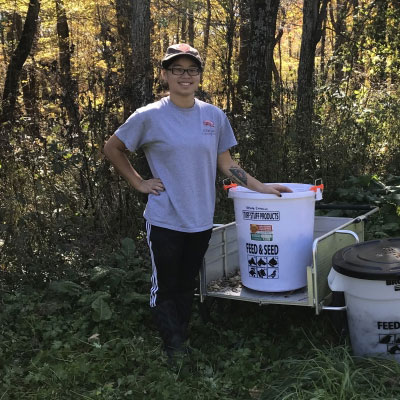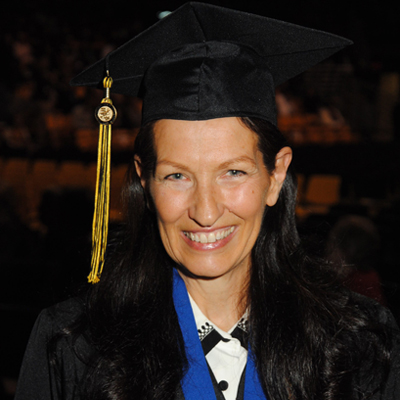Sustainable Development (BS) - Agroecology and Sustainable Agriculture

Application Deadlines
Location
Boone campus
Got credits?
Learn about transferring credits to App State
Develop sustainable food systems for all.
If you want to learn about sustainability, why not do it in the country’s first sustainable development program? For more than 30 years, App State has been dedicated to developing leaders in sustainable development. You can be a part of the next generation.
App State’s Bachelor of Science (BS) in Sustainable Development - Agroecology and Sustainable Agriculture degree program is where you will learn to build food systems that provide healthy food and support local community life. You will study fundamental ecological processes such as nutrient cycling, effective solar capture, efficient use of water, and interactions among plants and animals and their environment. You also will learn to analyze the ecological, economic and cultural dimensions of complex food systems.
An added benefit: You’ll get to study and work on App State’s Sustainable Development Teaching and Research Farm, one of the largest sustainable agriculture teaching-research farms in the country.
R2 for high research activity
App State has earned a Research 2 Carnegie Classification, recognizing the university’s high research activity and doctorate production. Learn more about App State’s R2 status
Top 5 in innovation
U.S. News & World Report has recognized App State as a top five school for innovation for nine consecutive years.
A ‘Best College’ for value
App State’s quality, affordability and student outcomes place it among the nation’s 2025 best schools for value, according to Money.com.
Elevate Your Education
Courses
Transferring Credits
Learn about App State’s credit transfer process, and use our Transfer Equivalency Course Search tool to determine how your courses may transfer to App State.
General Education
With courses in history, natural and social sciences and humanities, App State’s General Education Program will reshape your outlook on learning and provide a foundational skill set that will prepare you for any career.
Accelerated Master’s
You can begin your graduate studies as an undergraduate and earn your master’s degree in as little as one year.
Careers and Mountaineers
Where can an App State degree take you? Anywhere you want to go! Our passionate and engaged alumni become leaders in their communities and chosen professions.
Careers
- Agriculture Extension Officer
- Consumer Researcher
- Agriculture and Food Education
- Farmer
- Farm Manager
- Farmers’ Market manager
- Food Policy Analyst
- Food Systems Advocacy work
- Health and Nutrition programs
- Horticulturist
- Farm Credit Analyst
- Garden Manager
- Land Conservation
- Natural Resources Specialist
- Non-profit work related to food systems
- Rural Development Worker
- International Relief Representative
Some of these roles may require education beyond a bachelor’s degree.
Employers
Recent graduates have been hired by:
- New River Organic Growers
- Grass to Greens
- Organic Growers School
- Green Opportunities
- AmeriCorps
- Planters Garden
- Mill Village Farms
- Riverbend Malt House
- MoM’s Organic Market
- Foodcorps
- Southern Appalachian Highlands Conservancy
- NC State Park System
- Schoolhouse of Wonder
- Peace Corps
Career information resource
App State’s Career Development Center
Services provided by the Career Development Center include resume reviews, career coaching, job and internship search assistance, and other tools for you to achieve life and professional success.
More to Explore at App State
Fund Your Education
Numerous scholarship and financial aid opportunities are available to help fund your App State education. Learn more about scholarships and financial aid.
International Experience
Work outside your cultural boundaries. Learn more.
Hands-on Research
Conduct cutting-edge research alongside faculty mentors. Learn more
State-of-the-art Facilities
Work in state-of-the-art research facilities. Learn more
Real-world Internships
Gain firsthand experience while earning your degree. Learn more
Find Your Community
Get inspired and get involved by joining App State clubs and organizations, such as the Sustainability and Environmental Education Club. Learn more
Honors College
Develop high-level creative thinking and research skills. Learn more and check out the departmental honors program.
Apply
Are you ready to become a Mountaineer? Take the next step, apply for admission to App State and elevate your future success.
Admissions questions? Contact us.
Connect
Visit Campus
Explore App State’s campuses in Boone and Hickory and learn more about what life is like as a Mountaineer.
Attend an information session to get to know App State’s people and programs.
Admissions Counselor
Have questions related to the App State admissions process? Our admissions counselors are here to help.





